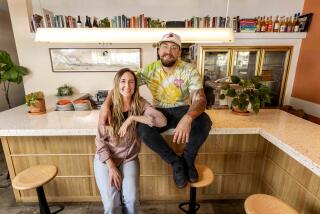Rent-a-kitchens sizzling
- Share via
NEW YORK — What pushed Priscilla Maddox was the relentless smell of vanilla.
Maddox was toying with launching a cookie line after retiring from her 36-year hospital care job, but was overwhelmed by the vanilla smell in her apartment. When she couldn’t find a kitchen to rent, she started a rent-a-kitchen that has become a small-business incubator for entrepreneurs including a fudge maker and a twosome baking gourmet dog food.
“Now we call ourselves missionaries because we’re helping people following their dreams,” Maddox said.
Kitchen For Hire, the Brooklyn-based business she opened in 2000 with partner Joan Reid, put Maddox’s cookie line dream on hold. The women set up in a cramped storefront that was previously home to a number of restaurants that never seemed able to stay in business. And for the last eight years, the 10-burner stove, refrigerators, freezers and mixers they inherited from the previous tenant have been put to good use.
Across the country, renting commercial kitchens by the hour has become a cottage industry. And as the nation’s economy has begun to weaken, many newly unemployed home cooks are looking to those kitchens for a new line of work.
The kitchen rental companies are a for-profit spin on an already well-tested idea. Food-business incubators, many affiliated with universities and nonprofit groups, help farmers and entrepreneurs with business development plans, market research and in some cases manufacturing.
Those who come to Kitchen For Hire, must be prepared to get a big serving of advice before they’re allowed to turn on the oven. Maddox is not shy about telling potential customers that their business strategy isn’t right, labels aren’t catchy enough or the food just isn’t marketable.
At least that’s what happened to Amanda Jones, who first approached Kitchen For Hire about two years ago with the idea of starting a fudge company.
“They refused to rent to me at first because they thought I wasn’t ready,” Jones said. “Turns out they were dead on. They gave me advice and helped me develop the product.”
After about a year of perfecting such things as product packaging and a business plan, Jones now operates Brooklyn Fudge -- which is sold in stores around New York. The business has grown enough to sustain her after spending what she calls “11 years in the corporate world.”
Customers at most kitchens spend about $20 an hour to rent the space, and in many cases need to purchase insurance that could run a few hundred dollars a year. Jones spends about $25 an hour for the kitchen rental, and product and kitchen insurance is about $600 a year. Another thing the shared-use kitchens have in common is their hours.
“It’s a 24/7 operation,” said Alexis Leverenz, who opened Kitchen Chicago after leaving Wall Street investment bank Merrill Lynch & Co. with dreams of starting her own business. “People come in here at all times of the day and night, and it is thrilling to watch them trying to start their own businesses.”
Leverenz said she has had a constant stream of interest since opening three years ago, and has even gotten some calls from people interested in starting their own rental kitchens.
A call to Leverenz for advice helped persuade Soraiya Nagree to strike out on her own. She and her husband opened Kitchen Space about four months ago in Austin, Texas.
They’ve outfitted Kitchen Space with three main areas -- a demonstration kitchen, a catering kitchen and a baking kitchen -- all with stainless steel appliances for the few dozen customers who have signed on. They also introduced a bit of technology to the concept, enabling customers to schedule their kitchen time online, and opened up an adjacent center where e-mail and other business can be done.
“For us it’s a business, but for others it’s an incubator for their own business dreams,” Nagree said. “It all kind of meets here.”
More to Read
Eat your way across L.A.
Get our weekly Tasting Notes newsletter for reviews, news and more.
You may occasionally receive promotional content from the Los Angeles Times.









